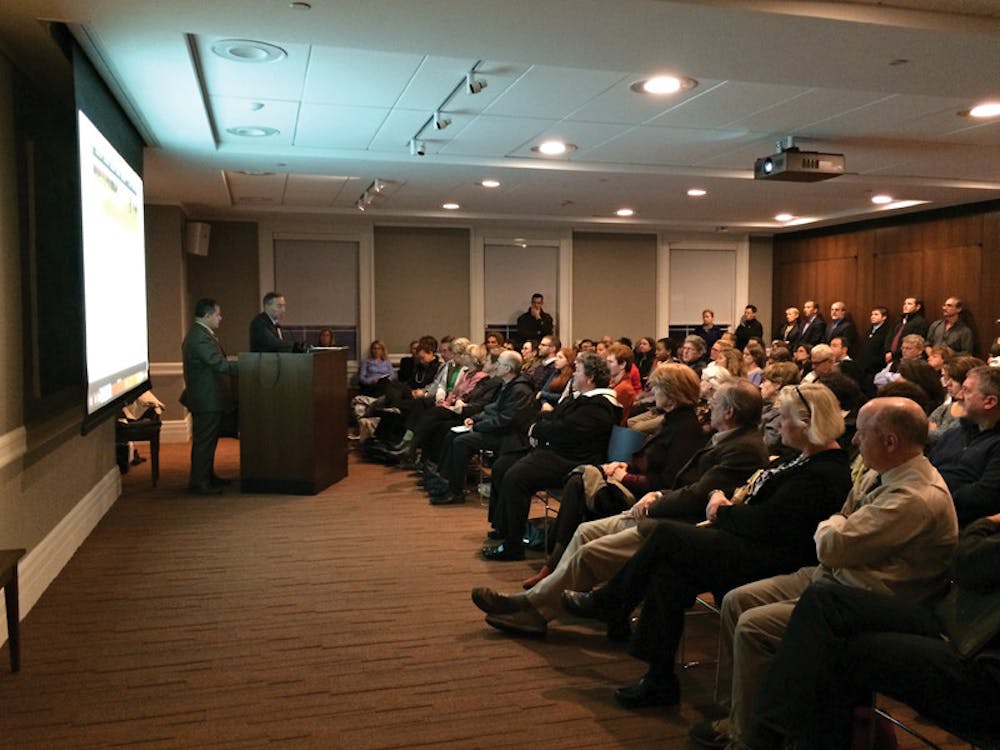The University plans to balance its $10 million structural operating budget deficit over the next three to five years, Provost Vicki Colvin announced to a crowd of about 100 at a University Resources Committee open forum Thursday in the Petteruti Lounge. The forum, as opposed to regular URC meetings, was open to the public in order to solicit opinions and suggestions in forming next year’s budget.
The University’s operating budget has skyrocketed over the last decade, growing from $480 million to just over $900 million, Colvin said. The “enormous amount of growth in the institution” over the last decade may be attributed to former President Ruth Simmons’ 2002 Plan for Academic Enrichment, which set lofty goals for the University’s expansion, she added.
Coordinating a rapidly growing budget is a “tricky business,” Colvin said. “It’s our growth and our aspirations that have put us in this position.”
The University’s endowment payout lags behind those of peer institutions, Colvin said, adding that over $400 million of the University’s $900 million in revenue comes from tuition. In contrast, endowment payout makes up the greatest single factor in the revenues of schools such as Harvard and Princeton.
But an operating deficit is not specific to Brown. Harvard and Yale are confronting deficits of over $30 million this year, Colvin said.
Because two major sources of revenue that had risen in past years — tuition and federal funding for research — have recently “flat-lined,” the URC and the recently founded Deficit Reduction Working Group must innovate in order to tackle the deficit issue, Colvin said.
The URC will collaborate with the group and senior administrators to compile a list of recommendations to be submitted to President Christina Paxson. Paxson will then submit revised recommendations to the Corporation, the University’s highest governing body, which will vote on the budget proposal at its February meeting.
But many voices, including those of students, staff members and faculty members, will be heard in the URC’s process of drafting recommendations, Colvin said, adding this is “why universities are not corporations.”
“We’ve got to raise endowment” in order to balance the budget and continue improving the quality of the programs and experiences Brown offers, said Beppie Huidekoper, executive vice president for finance and administration.
But even a substantial increase in endowment payout would need to be accompanied by spending cuts, she added.
Employee compensation makes up the largest part of the University’s expenditures, accounting for about $400 million of the roughly $900 million budget.
Huidekoper demonstrated how modifying certain expenses would affect the budget using a model on a projector. When she lowered the increase in overall compensation for the next fiscal year by 0.1 percent, the deficit shrunk considerably.
Substantial hikes in tuition, the University’s main source of revenue, could also go a long way toward balancing the budget, Huidekoper said. But she added that doing so would burden families, which the URC hopes to avoid.
Tuition hikes must be coupled with boosts in financial aid that exceed tuition increases by approximately 2 percentage points, Huidekoper said. Therefore, if the University raises tuition by 3 percent, financial aid must increase by 5 percent.
The University increased tuition by 3.8 percent last year, which corresponded with a 5.5 percent bump in financial aid expenditures,The Herald previously reported.
The Deficit Reduction Working Group will spearhead efforts to balance the budget by identifying possible areas of expenditure reduction that will not harm the University’s “basic structures,” said Richard Locke, director of the Watson Institute and the group’s co-chair.
The University spends $30 million annually on buying supplies, Locke said. This type of expenditure can probably be reduced if the committee considers how the University is going about spending, he added.
Professor of Chemistry Gerald Diebold said the University could reduce expenditures by halting donations to Providence, adding that he believes the donations often come “out of the blue” from the administration.
Another attendee suggested that the University monitor expenses allocated for graduate student support, questioning why such expenses have climbed steeply over the last few years.
Huidekoper responded that while expenses for graduate student support have risen, the extent of the rise is not as extreme as the numbers seem. Graduate students’ tuition is paid for by the University and federal funding, and previous statistics do not reflect equivalent amounts of University tuition support.
Colvin closed the meeting with an expression of confidence in the URC. The efforts of the committee members, reinforced by the ideas they have already begun to solicit from the wider Brown community, will help the University overcome the obstacle of the deficit with innovation, she said.
“I’m very positive that this is not going to be necessarily a burden,” Colvin said. “We’re going to emerge more efficient and strong.”

ADVERTISEMENT




